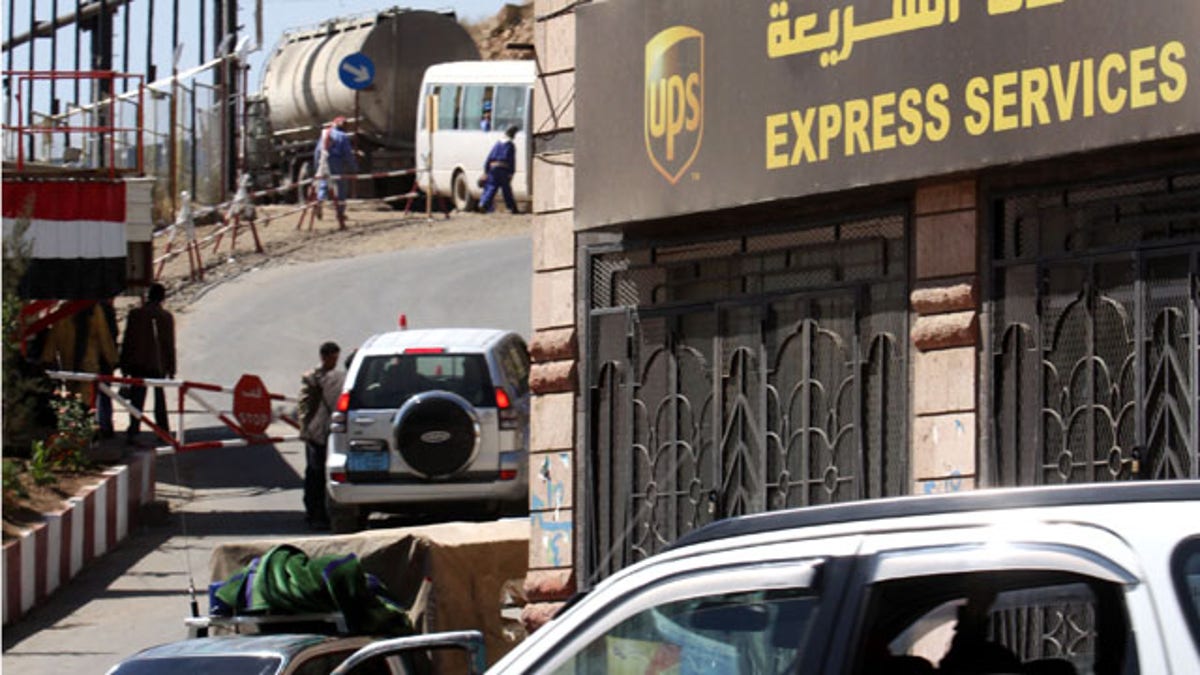
Nov. 2: Policemen guard UPS office in San'a, Yemen. (AP)
WASHINGTON -- Even after a suspected test run in September, last week's attempted mail bombings from Yemen were a shot in the dark for al-Qaida, which could not have known exactly where its packages were when they were set to explode, U.S. officials said Tuesday.
When investigators pulled the Chicago-bound packages off cargo planes in England and the United Arab Emirates Friday, they found the bombs wired to cell phones. The communication cards had been removed and the phones could not receive calls, officials said, making it likely the terrorists intended the alarm or timer functions to detonate the bombs.
"The cell phone probably would have been triggered by the alarm functions and it would have exploded mid-air," said a U.S. official briefed on the investigation, who like other officials spoke on condition of anonymity to discuss the case.
The official also said Tuesday that each bomb was attached to a syringe containing lead azide, a chemical initiator that would have detonated PETN explosives packed into each printer cartridge. Both PETN and a syringe were used in the failed bombing last Christmas of a Detroit-bound airliner.
Officials on three continents thwarted last week's mail bomb plot, the culmination of more than a month of intelligence-gathering, officials said. The Obama administration, which has been monitoring intelligence on possible mail plots since at least early September, was preparing new security rules for international cargo in response to the attempted attack.
In response, the Obama administration intends to tighten security on U.S-bound cargo. Security officials are considering requiring that companies provide information about incoming cargo before planes take off, one U.S. official said. Currently, the U.S. doesn't get that information until four hours before a plane lands.
A second official said the U.S. will also expand its definition of high-risk cargo, meaning more cargo will be screened from countries known as hotbeds of terrorism.
President Barack Obama stressed the need for stronger security for air cargo in a telephone conversation Tuesday with Ali Abdullah Saleh, Yemen's president, the White House said.
Investigators believe al-Qaida mailed three innocent-looking packages from Yemen to Chicago in mid-September to watch the route they took.
One of those packages contained a copy of British author George Eliot's 1860 novel "The Mill on the Floss." Authorities were investigating whether it was a subtle calling card from Anwar al-Awlaki, the U.S.-born Yemeni cleric who has inspired a string of attempted attacks against the West.
The militant cleric is now a fugitive, targeted by a U.S. kill or capture list. Yemeni authorities put him on trial in absentia Tuesday, charging him as a new defendant in the October killing of a French security guard.
Al-Awlaki became well versed in English literature while in prison in Yemen from 2006 to 2007 and later posted online book reviews slamming Shakespeare and praising Charles Dickens. Beyond that, however, there was no immediate connection between al-Awlaki and the book found in the package mailed in September, one U.S. official said.
Shipping carriers allow Internet users to monitor packages from point to point through the international cargo system.
While a test run would have given al-Qaida a sense of the shipping routes, there was no guarantee the route would be the same a month -- or even a day -- later, officials at UPS and FedEx said Tuesday. Routes change based on the weather, cargo volume and plane schedules, they said.
Neither company lets customers see precisely which planes their packages are on. Sometimes they are packed on cargo planes, sometimes on passenger planes. There is no way for customers to track their packages in real time while in flight, officials with both companies said.
Still, knowing the time shipments were logged in leaving Europe and the time they were scanned arriving in Chicago would have given al-Qaida operatives a large enough time window to allow them to have rigged their bombs to blow up somewhere along the way.
But a more spectacular and devastating explosion -- in the sky, above Chicago for instance -- would have been far more difficult to time.
For al-Qaida, which is known to pick symbolic targets aimed at generating fear and media attention, blowing up cargo planes doesn't have the same payoff as taking down a passenger jet.
But after failing to take down a U.S.-bound jetliner on Christmas, al-Qaida's Yemen branch may have been looking for an easier target, officials said.
Striking targets inside the United States, such as the two Chicago-area synagogues, might have been an attractive but more difficult reach. But because the addresses for the synagogues were out of date and the names on the packages included references to the Crusades -- the 200-year wars waged by Christians largely against Muslims -- officials do not believe the synagogues were targeted.
Investigators are looking at why terrorists selected two Chicago synagogues as the recipients of the packages. The latest issue of al-Qaida's online magazine, Inspire, featured a picture of Chicago's skyline and the words "United Snakes of America." Authorities were investigating whether there was a connection between the magazine and the bombs.
The bombs were not designed to detonate upon opening the packages, a U.S. official said.
U.S. intelligence officials warned in September that terrorists hoped to mail chemical and biological materials as part of an attack on America and other Western countries using the mail. The alert came in a Sept. 23 bulletin from the Homeland Security Department and obtained by The Associated Press.
Then, just days before the thwarted attack, FBI and Homeland Security officials circulated an internal bulletin reminding authorities that American-born al-Qaida spokesman Adam Gadahn had called for smaller, easier plots that require less coordination.
"Even apparently unsuccessful attacks on Western mass transportation systems can bring major cities to a halt, cost the enemy billions, and send his corporations into bankruptcy," the bulletin quoted Gadahn as saying.

